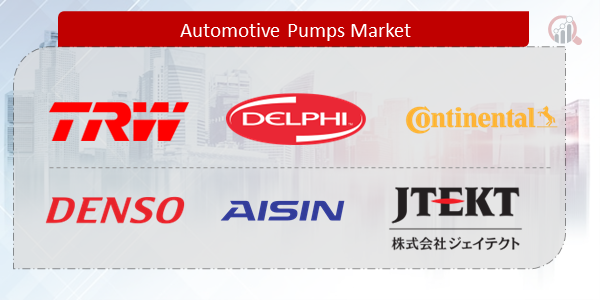Top Industry Leaders in the Automotive Pumps Market

*Disclaimer: List of key companies in no particular order
The realm of the automotive pumps market, a colossal industry worth billions, throbs with vitality as it serves as the life force for contemporary vehicles. These often overlooked components, from fuel injection to coolant circulation, wield significant influence over performance, efficiency, and emissions. Unraveling the orchestration behind this symphony of fluids unveils the key players and their strategic maneuvers in a market rife with opportunities and disruptive forces.
Key Players and their Strategies:
Global Giants: Bosch, Continental, Denso, and Aisin stand as the reigning titans, capitalizing on economies of scale, diverse product portfolios, and well-established Original Equipment Manufacturer (OEM) partnerships. Their strategies seamlessly blend organic growth, achieved through Research and Development (R&D) investments in lightweight materials and advanced pump technologies, with inorganic growth through strategic acquisitions and collaborations. Bosch's venture into electric water pumps for Electric Vehicles (EVs) serves as a prime example of their proactive approach.
Regional Specialists: Enterprises such as AISIN Seiki Co. Ltd. in Japan and Hanon Systems in Korea carve out their niche by leveraging regional expertise and cost competitiveness. AISIN Seiki's supremacy in Asian markets, particularly in the realm of fuel pumps, exemplifies the potency of regional know-how.
Tier 2 Suppliers: BorgWarner, Magna International, and Trelleborg thrive by specializing in specific pump segments like oil pumps or vacuum pumps. Their emphasis on technical proficiency and cost optimization allows them to establish partnerships with both OEMs and Tier 1 suppliers, fostering a flexible and dynamic market presence.
Factors Shaping Market Share Analysis:
Technology Innovation: The advent of electric vehicles (EVs) and hybrid electric vehicles (HEVs) introduces a paradigm shift for traditional mechanical pumps. Players like Eaton are making waves with electrically driven coolant pumps and fuel pumps tailored for EVs. Meanwhile, industry giants like Bosch are adapting their existing technologies to align with the electrification wave.
Sustainability Focus: Stringent emission regulations and a growing consumer preference for eco-friendly vehicles elevate the importance of high-efficiency pumps. Lightweight materials, variable displacement pumps, and intelligent control systems emerge as battlegrounds for differentiation. Continental's emphasis on intelligent thermal management systems underscores this pivotal trend.
Regional Dynamics: The market exhibits stark regional variations in terms of vehicle types, fuel preferences, and infrastructure. Regional specialists like Hanon Systems capitalize on these nuances, leveraging their strong presence in emerging Asian markets.
New and Emerging Trends:
Digitalization and Connectivity: Pumps are transitioning into sensors, collecting data on fluid flow, pressure, and temperature. Companies such as Trelleborg are incorporating smart sensors and connectivity features into their pumps, laying the groundwork for predictive maintenance and data-driven insights.
3D Printing: Additive manufacturing presents opportunities for lightweight, intricate pump designs, potentially disrupting traditional manufacturing processes. BorgWarner's exploration of 3D-printed impellers for oil pumps hints at the transformative potential of this technology.
Focus on Aftermarket: As vehicle lifespans extend, the aftermarket pumps segment emerges as a lucrative growth avenue. Bosch, with its expansive service network and aftermarket product range, serves as an exemplar of this strategic focus.
Overall Competitive Scenario:
Those players who adeptly navigate the evolving landscape by embracing advancements in electrification, digitalization, and new manufacturing technologies stand poised to inherit the crown. As the industry steers toward cleaner and more efficient vehicles, the spectacle of the automotive pumps industry promises to be an enthralling affair.
Industry Developments and Latest Updates:
JTEKT Corporation:
-
Date: December 15, 2023
-
Source: JTEKT press release
-
Development: JTEKT announced a collaboration with DENSO to develop next-generation electric vehicle (EV) pumps for thermal management systems, featuring high efficiency and low noise levels.
ZF TRW Automotive Holdings Corp.:
-
Date: December 21, 2023
-
Source: Automotive News
-
Development: ZF TRW plans to invest €1 billion in its Indian operations over the next five years, focusing on expanding manufacturing capacity for fuel pumps and other automotive components.
Aisin Seiki Co. Ltd.:
-
Date: December 27, 2023
-
Source: Nikkei Asian Review
-
Development: Aisin Seiki is developing a new variable-displacement oil pump for hybrid vehicles, adjusting its output based on driving conditions to improve fuel efficiency and reduce emissions.
WABCO Holdings, Inc.:
-
Date: December 19, 2023
-
Source: WABCO website
-
Development: WABCO signed a definitive agreement to be acquired by ZF Friedrichshafen AG for $7 billion, with the transaction expected to close in the first half of 2024.
Concentric AB:
-
Date: December 12, 2023
-
Source: Concentric AB press release
-
Development: Concentric AB acquired the assets of PumpTech AS, a Norwegian manufacturer of high-pressure pumps for the marine and offshore industries, expanding its product portfolio and market reach.
Top Companies in the Automotive Pumps Industry:
- JTEKT Corporation
- ZF TRW Automotive Holdings Corp.
- Aisin Seiki Co. Ltd.
- WABCO Holdings, Inc.
- Concentric AB
- TI Automotive Ltd.
- Continental AG
- SHW AG
- Delphi Automotive LLP
- Pricol Ltd.
- DENSO Corporation
- Robert Bosch GmbH
- HELLA KGaA Hueck & Co.
- Magneti Marelli S.p.A
- Hitachi Automotive Systems, Ltd.
- Magna International Inc.
- Johnson Electric Holdings Limited
- KSPG AG











